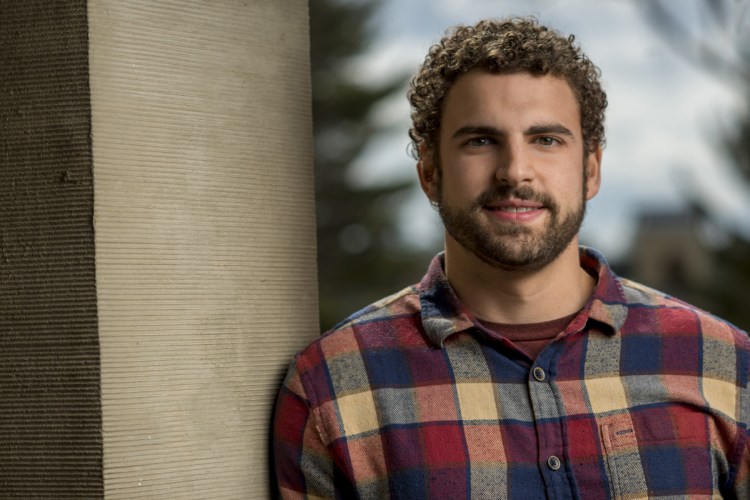Garrett Raymond is finishing up his master’s at the University of Maine’s School of Economics next month. But before he does, he’s making a last big push for a school project near and dear to his heart. Raymond is a member of a campus-based group called Maine Community Energy Advocates. The group’s goal is to advance community energy projects in the state, and one of the ways they want to do that is by creating a specialty license plate around the theme of sustainability, specifically in the arena of energy use and generation. When we called him, we learned about the intricacies of designing and creating specialty plates and why the project caught his attention.
ROOTS IN THE WOODS: Raymond considers himself well shaped by having spent his early childhood in Montville. “Pretty out in the woods, right on a brook where you could go out and catch some brook trouts and pick fiddleheads. You really learn an appreciation for nature growing up that way.” After his parents divorced he lived mostly in Augusta, but the woodsy life and all that it gave him stuck with him, inspiring an awareness of the need to live sustainably to protect our natural resources and to combat climate change. He’s in no doubt about the realness of climate change. “My generation in general really realizes that it is a problem. It has existed in common discussions since we were kind of young.”
LESSONS LEARNED: He was introduced to the whole topic of a sustainably oriented license plates by one of his undergraduate professors, Sharon Klein, during an energy economics class. “One of the ideas of the lesson is we were supposed to reach out to people in the community, find out how they think the money from the plates should be spent. It was pretty good practice for how to approach a real world, grassroots campaign.” The project lay fallow for about a year as Raymond was transitioning to graduate school, and he returned to it last summer.
YOU’RE NOT SO VAIN: Maine already has a number of specialty license plates – vanity plates are the ones where you get to pick the letters. These feature backdrops such as the lobster, the loon, agriculture. Specialty plates cost the driver a little more and after fees to the state, the proceeds are typically used for special causes. The lobster plate, for instance, raises money for the Lobster Research, Education and Development Board, which then reviews and distributes grants within that field (example: in 2016 the University of Maine itself received a $127,000 grant from the lobster board to research lobster health in the changing ecosystem). That’s the model Raymond and a group of about 15 other members of Maine Community Energy Advocates are planning for the sustainmaineplate.com project.
WHAT’S IN A NAME? When Raymond talks about community energy he’s referring to projects like residents banding together on Peaks Island to buy heat pumps in bulk, a shared solar farm in Freeport, or the kind of window insert building projects regularly run by WindowDressers, where community members work together to help their fellow Mainers insulate drafty windows. “WindowDressers is great. They were actually a big inspiration for this whole idea. I just thought, we need more of that kind of program and more funding for it.”
SIGN UP FOR SUSTAINABILITY: The Maine Community Energy Advocates are about to hit the road, heading out to community meetings of environmental groups to spread the word about the license plate. So far, how many have they signed up? “Not very many.” They’ve got until this fall to find 2,000 people who want the license plate; Maine’s Department of Motor Vehicles won’t proceed with the plate otherwise. It costs $26.99 by the way, and $20 each year for the renewal. (The ordering form is at sustainmaineplate.com.)
LIGHT BULB AND A MOOSE: The group found Jessica Huff, a student in UMaine’s New Media Program, to design the plate. It’s got a blue background, a light bulb topped with an evergreen and a moose, as well as the words SUSTAIN MAINE across the bottom. Huff had to keep it simple, including her color palette. “You are only allowed four colors.”
GO SOUTHWEST YOUNG MAN: After finishing up his masters in economics, Raymond is headed to New Mexico to participate in Teach for America. He has no idea what to expect. “I don’t know for sure what I will be teaching or what grade.” Any hopes? “High school. I think there is probably more diversity of ideas among high school students.” But what about Maine? “As much as I do enjoy winter here, I think I am ready for a few years away from it.”
Mary Pols can be contacted at 791-6456 or at:
Twitter: MaryPols
Copy the Story LinkSend questions/comments to the editors.




Success. Please wait for the page to reload. If the page does not reload within 5 seconds, please refresh the page.
Enter your email and password to access comments.
Hi, to comment on stories you must . This profile is in addition to your subscription and website login.
Already have a commenting profile? .
Invalid username/password.
Please check your email to confirm and complete your registration.
Only subscribers are eligible to post comments. Please subscribe or login first for digital access. Here’s why.
Use the form below to reset your password. When you've submitted your account email, we will send an email with a reset code.